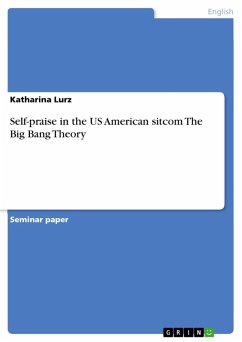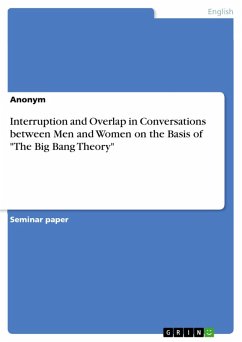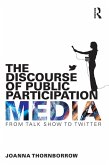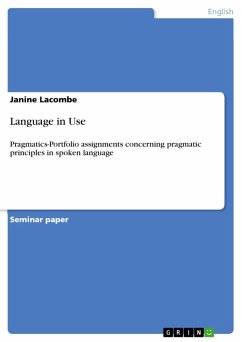Seminar paper from the year 2014 in the subject English Language and Literature Studies - Other, grade: 1,3, University of Bonn, language: English, abstract: Even though self-praise poses a socially problematic speech act, it appears that self-praise is used in sitcoms quite often for comic effects. This term paper deals with the question which strategies the fictional character Sheldon Cooper in the US American sitcom The Big Bang Theory applies when performing self-praise. On that account, the paper will follow the lead of Daria Dayter in her article "Self-Praise in microblogging". The strategies for self-praise found by Dayter will present the framework for this specific study. Therefore, this paper will not deal with structural characteristics of those utterance but only with the strategies applied. As self-praise seems to be used for comic effects in the sitcom, I assume that the results conducted in this paper will not contain many mitigation devices when self-praise is being performed. Furthermore, it seems that the article by Dayter is the only specific study on self-praise so far. Hence, the study of self-praise poses a quite unsought area and thus provides the possibility for an individual study that will not have to rely on previous studies with a similar content. As this paper deals with self-praise in the US American sitcom, it poses an interesting crossover between the fields of film language and self-praise studies. As the study of self-praise increasingly gained attention among researchers since self-portrayal via social media websites like Twitter became possible and almost socially acceptable, spreading the issue to a scripted context constitutes a completely unexplored area of research. In this paper, I will first give a brief overview of Dayter's study on the topic in my literature review section. I will also take into account some important studies on compliment responses, as Dayter extracted her strategies for self-praise from those. Then there will be an elaboration on the methodology applied to this paper, followed by a more detailed outline of the strategies and the data that will be investigated in this work. Afterwards the results will be presented and ultimately a critical discussion of the findings. In the end a conclusion will be provided to give an overview for further possible fields of research and to offer a precise summary of the results.
Dieser Download kann aus rechtlichen Gründen nur mit Rechnungsadresse in A, B, BG, CY, CZ, D, DK, EW, E, FIN, F, GR, HR, H, IRL, I, LT, L, LR, M, NL, PL, P, R, S, SLO, SK ausgeliefert werden.









